Achieve Strength with Vegan Powerlifting
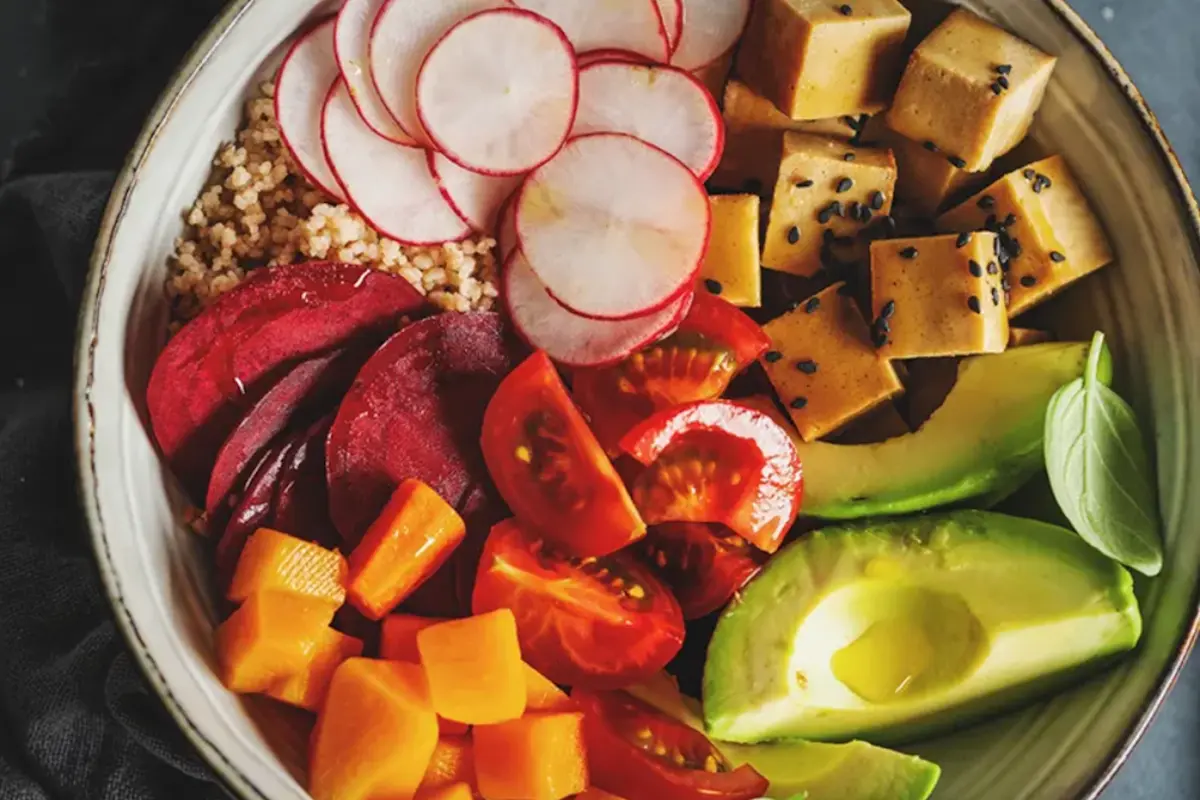
What's In This Article
- Key Highlights
- Introduction to Plant-Based Strength Training
- Nutritional Foundations for Vegan Powerlifters
- What to Eat as a Vegan Strength Athlete
- How to Build a Balanced Vegan Powerlifting Diet
- Supplementation Strategies for Vegan Athletes
- Evaluating Common Plant-Based Protein Sources
- The Soy Debate: Testosterone Levels and Plant-Based Diets
- Advantages of a Vegan Diet in Athletic Performance
- Conclusion: Embracing Vegan Powerlifting
- Frequently Asked Questions
- References
- Resources
Key Highlights
- Champion powerlifter Nick Squires has proven that elite performance is possible on a vegan diet, excelling in major lifts for nearly a decade.
- Vegan powerlifters can build muscle through foods like lentils, chickpeas, tofu, and quinoa, supplemented with plant-based protein powders.
- Research shows that plant-based proteins are effective for muscle synthesis when consumed in sufficient quantities and variety.
- Quick recovery is a major advantage of vegan diets due to their high content of anti-inflammatory compounds and antioxidants.
- Studies have conclusively shown that soy consumption does not negatively affect testosterone levels in men.
- Essential supplements for vegan powerlifters include vitamin B12, iron, omega-3 fatty acids, vitamin D, and creatine.
Introduction to Plant-Based Strength Training
The merging of veganism with powerlifting challenges traditional views on athletic nutrition. Champion powerlifter Nick Squires has shattered stereotypes by excelling on a vegan diet for nearly a decade, achieving personal bests in major lifts.
Powerlifting focuses on the squat, bench press, and deadlift to build strength. It needs a variety of nutrients for muscle repair. Vegan athletes have been turning towards plant-based foods for amino acids, essential proteins, carbs, and fats for energy and muscle building.
This shift is underpinned by scientific research indicating that plant-based diets can provide all the necessary components for muscle growth and recovery. Lynch et al. (2020) highlight the adequacy of plant-based proteins when consumed in sufficient quantities and variety, challenging the myth that animal products are superior for muscle synthesis.
A powerlifting coach plays an invaluable role by advising on effectively integrating high-protein vegan foods, healthy fats, and carbohydrates to enhance intense training schedules. By working with a coach strategically planning meals and incorporating vital supplements such as vegan protein powder and B12, vegan athletes can attain a nutrient balance crucial for their health and athletic performance.
We have worked with several vegan lifters at Sportive Tricks and helped them assess and adjust their diets to fuel the intensity of sessions and recovery.
Nutritional Foundations for Vegan Powerlifters
Understanding calorie and macronutrient distribution for vegan powerlifters is key to fueling workouts and aiding recovery. Adequate calorie intake supports energy, muscle repair, and growth in strength training. Powerlifting's intensity requires higher energy intake than average dietary needs. Still, Ryan Stills, a world champion in the IPF 120kg weight class, has shown that veganism is compatible with elite powerlifting performance.
Several factors influence the caloric needs of vegan athletes:
- Training and body composition goals
- training intensity
- Body weight
- Muscle mass
- Metabolic efficiency
A tailored approach, often developed in collaboration with a nutrition-savvy powerlifting coach, ensures that the athlete consumes enough calories to generate a total calorie intake to match the athlete's goals.
Macronutrients—carbohydrates, proteins, and fats—play distinct and pivotal roles in a powerlifter's diet:
- Carbohydrates fuel high-intensity training and aid recovery. A vegan diet rich in whole grains, fruits, and vegetables supplies necessary carbohydrates, dietary fiber, vitamins, and minerals..
- Protein is crucial for muscle repair and growth, especially for vegan powerlifters. They must focus on consuming various plant-based sources to get all essential amino acids. Research highlights the significance of diverse plant proteins (Langyan et al., 2022).
- Fat intake, particularly from unsaturated fats like nuts, seeds, and avocados, provides essential fatty acids and helps the body absorb fat-soluble vitamins. Healthy fats are a crucial energy source and support hormone production, including those vital for muscle growth and recovery.
Consuming carbohydrates and protein before and after workouts can enhance energy availability during training and promote muscle protein synthesis post-exercise.
This strategic nutrient timing and a balanced distribution of calories and macronutrients throughout the day support sustained energy levels, muscle repair, and growth.
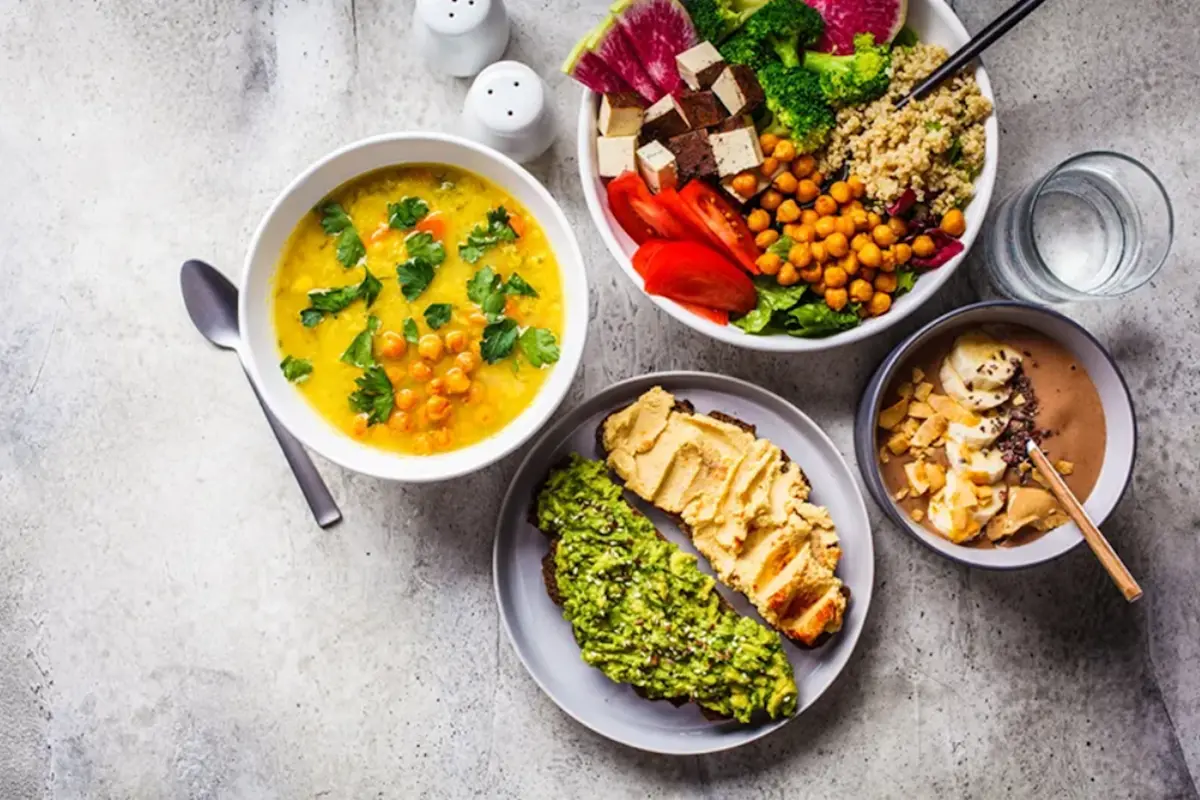
What to Eat as a Vegan Strength Athlete
Nigel Morton, a lifelong vegetarian turned vegan powerlifter, has achieved impressive feats such as squatting 300kg at 121kg bodyweight. He emphasizes that veganism is not a limiting factor for strength sports and aims to prove that one can get stronger consistently on a plant-based diet.
Legumes and Beans
- Lentils: 18g protein per cooked cup, rich in fiber, iron, and zinc
- Chickpeas: Rich in protein, fiber, iron, and zinc
- Black beans: Rich in protein, fiber, iron, and zinc
- Kidney beans: Rich in protein, fiber, iron, and zinc
- Sweet potatoes: High in fiber, carbohydrates, and vitamin A
- Beetroot: Contains nitrates, increases endurance, lowers blood pressure
- Spinach: Contains nitrates, increases endurance, lowers blood pressure
Whole Grains
- Brown rice: High-quality carbohydrates and modest protein content
- Quinoa: Complete protein (contains all 9 essential amino acids), high-quality carbohydrates
- Oats: High-quality carbohydrates and modest protein content
- Whole grain bread: High-quality carbohydrates and modest protein content
Nuts and Seeds
- Almonds: Rich in healthy fats and protein
- Walnuts: Rich in healthy fats and protein
- Chia seeds: Contains healthy fats, protein, and omega-3 fatty acids
- Flaxseeds: Contains healthy fats, protein, and omega-3 fatty acids
- Hemp seeds: Contains healthy fats, protein, and omega-3 fatty acids
Plant-based Protein Powders
- Pea protein powder
- Rice protein powder
- Plant protein blends
These can help athletes meet their elevated protein needs without excessive volume. These powders can be easily added to smoothies, oatmeal, or baking recipes, offering a convenient boost of high-quality protein.
Vegetables and Fruits
- Leafy greens (spinach and kale): Rich in vitamins, minerals, antioxidants, and iron; supports recovery and reduces inflammation
- Berries: Contains vitamin C for collagen production and immune function
- Citrus fruits: Contains vitamin C for collagen production and immune function
Healthy Fats
- Avocado oil
- Olive oil
- Coconut oil
These supply monounsaturated and saturated fats, vital for energy and cellular health. These fats are also crucial for absorbing fat-soluble vitamins (A, D, E, K) that support a range of bodily functions from bone health to immune response.
Soy Products
- Tofu
- Tempeh
- Soy milk
These sources provide a versatile base for many recipes. They can mimic many animal-based foods' texture and nutritional profile, enriching the vegan diet with calcium, iron, and phytochemicals.
Nutritional Yeast
A favourite among vegan athletes for its cheesy flavour, nutritional yeast is a fortified product that provides B vitamins, including B12, which is typically challenging to obtain from a plant-based diet.
It also offers additional protein and can be sprinkled on meals to enhance flavour and nutritional value.
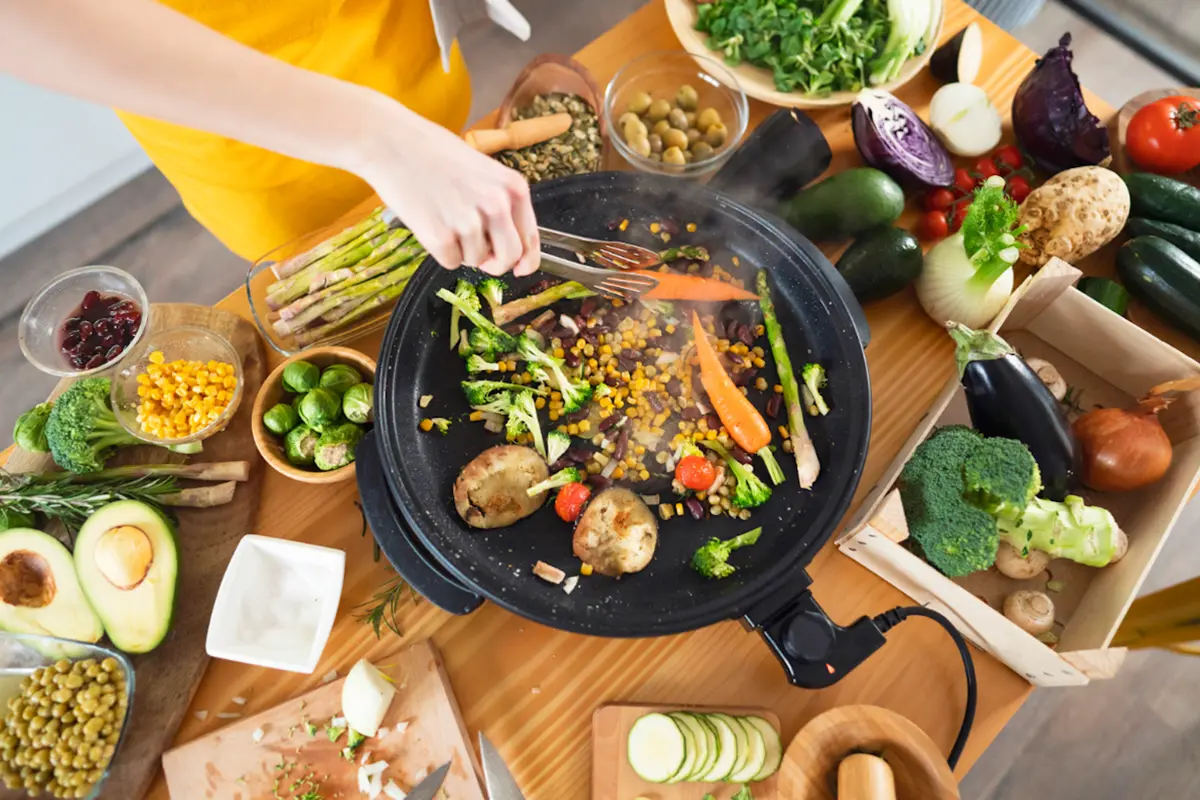
How to Build a Balanced Vegan Powerlifting Diet
Bradie Crandall, a vegan powerlifter, transitioned to veganism before starting competitive powerlifting. He stresses the importance of continuous learning about nutrition to support his training.
Determine Caloric Needs
- The foundation of any diet is understanding caloric requirements, which vary based on training intensity, body composition goals, and individual metabolic rates.
- Powerlifters generally require a higher calorie intake to support their training regimen.
- Online tools or consulting with a nutritionist can help calculate a starting point for daily caloric intake, which can then be adjusted based on progress and goals.
Balance Macronutrients
- Adequate protein intake is critical for muscle repair and growth.
- Carbohydrates are the primary fuel source for intense training sessions
- Fats are necessary for hormonal health and energy.
A balanced distribution might look like:
- 50-60% of calories from carbohydrates
- 20-30% from protein
- 20-30% from fats
Adjustments are made based on individual responses and preferences.
Opt for Whole, Nutrient-Dense Foods
- Prioritise whole foods over processed ones to maximise nutrient intake.
- Whole grains, legumes, vegetables, fruits, nuts, and seeds should form the bulk of the diet, providing a broad spectrum of vitamins, minerals, and phytonutrients.
Incorporate a Variety of Protein Sources
- To ensure intake of all nine essential amino acids, include a variety of plant-based sources throughout the day.
- Combining different sources, such as beans with rice or peanut butter with whole-grain bread, can provide complete proteins necessary for muscle development.
Plan Meals Around Training
- Nutrient timing can enhance performance and recovery.
- Consuming a meal rich in carbohydrates and protein approximately 2-3 hours before training can optimise energy levels.
- Following up with a similar meal or snack after training can help muscle recovery and glycogen replenishment.
Stay Hydrated
- Adequate hydration is essential for optimal performance and recovery.
- Water supports every metabolic function and nutrient transfer in the body and can significantly impact strength levels and endurance.
Consider Supplementation
- While a well-planned vegan diet can meet most nutritional needs, specific nutrients, such as vitamin B12, vitamin D, omega-3 fatty acids, and iron, may require supplementation to achieve optimal levels.
Supplementation Strategies for Vegan Athletes
A well-planned vegan diet can support optimal health and athletic performance, but some plant-based foods may lack some nutrients. Vegan athletes, particularly powerlifters, may benefit from supplementation to address nutritional gaps and enhance performance and recovery:
- Vitamin B12: Essential for nerve function and blood cell formation, vitamin B12 is naturally found in significant amounts only in animal products. Deficiency can lead to anaemia and fatigue, significantly impacting athletic performance.
- Iron: Important for oxygen transport and energy production, iron is available in plant foods but in a form that is less easily absorbed by the body. Combining vitamin C-rich foods with iron sources can enhance absorption. Still, an iron supplement may benefit some, particularly female athletes.
- Omega-3 Fatty Acids: Crucial for heart health, joint health, and inflammation control, omega-3 fatty acids are primarily found in fish. Vegans can opt for algae-based DHA and EPA supplements to ensure they receive these fats.
- Vitamin D: Essential for bone health and immune function; vitamin D is challenging to obtain in adequate amounts from diet, as it is available primarily through sun exposure and fortified foods. A vitamin D supplement can support overall health, particularly during winter or for individuals with limited sun exposure.
- Calcium: While available in fortified plant milk and leafy greens, calcium intake can be a concern for vegans due to variations in absorption rates. A supplement may be necessary to meet the recommended intake and support bone health, especially for ageing athletes.
- Protein Powders: Meeting the elevated protein requirements of powerlifting can be challenging through whole foods alone. Vegan protein powders, such as those derived from peas, rice, or hemp, can provide a convenient and efficient way to increase intake.
- Creatine: Naturally found in animal foods, creatine is a popular supplement for increasing power output and building muscle and mass. Vegan athletes may have lower baseline levels of creatine.
- Zinc: Important for immune function and protein synthesis, zinc is another nutrient that may be less bioavailable in plant-based sources. A modest zinc supplement can help ensure adequate levels are maintained.
- Iodine: Often overlooked, iodine is vital for thyroid function and metabolism. With limited plant-based sources, especially for those who do not consume iodised salt or sea vegetables, an iodine supplement might be considered to prevent deficiency.
For vegan athletes, selecting third-party tested supplements is crucial for quality and purity. A healthcare provider or a sports nutrition dietitian can personalize supplementation for optimal benefits and safety.
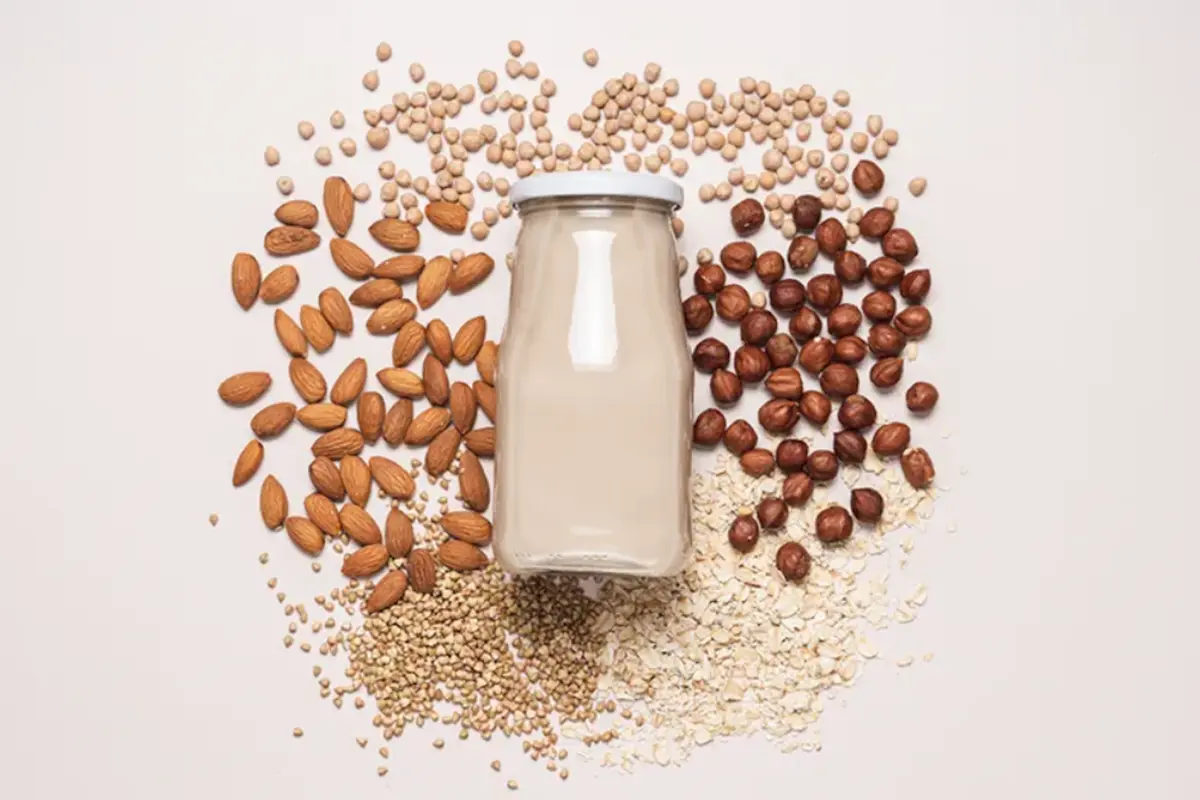
Evaluating Common Plant-Based Protein Sources
Protein is crucial for athletes, particularly in strength sports like powerlifting. Vegan athletes must carefully choose plant-based foods to meet their protein needs and essential amino acids.
Legumes
- Beans, lentils, and peas are key proteins in the vegan diet, offering a high protein content alongside fiber, iron, and phytonutrients.
- Including legumes in daily meals contributes significantly to meeting protein needs while supporting a healthy digestive system and iron status.
Whole Grains
- Often underestimated as protein sources, whole grains like quinoa, buckwheat, and amaranth contribute valuable carbohydrates for energy and contain notable amounts of protein.
- Quinoa, in particular, is revered for being a complete protein, containing all nine essential amino acids necessary for muscle synthesis.
Nuts and Seeds
- Almonds, chia seeds, hemp seeds, and flaxseeds are sources of healthy fats and provide protein and other essential nutrients like omega-3 fatty acids and magnesium.
- Hemp seeds stand out for their protein quality, offering about 10 grams per three tablespoons, alongside a beneficial omega-6 to omega-3 ratio.
Soy Products
- Tofu, tempeh, and edamame are among the most protein-rich vegan foods, with soybeans offering a complete amino acid profile.
- Tofu can be easily incorporated into various dishes, providing about 20 grams of protein per 1/2 cup serving. This makes it a versatile and practical option for muscle building.
Plant-based Protein Powders
- Vegan protein powders made from peas, rice, hemp, or mixed sources can efficiently supplement protein intake for those struggling to meet protein requirements through whole foods alone.
- These powders can be beneficial post-workout to support muscle recovery and growth.
Nutritional Considerations
- While plant-based proteins offer numerous health benefits, including lower saturated fat levels and additional nutrients, they often contain less protein per serving than animal-based sources. This means vegan athletes may need more food to meet their protein needs.
- Additionally, most plant proteins, except for soy and quinoa, are considered incomplete, lacking one or more essential amino acids. However, eating a variety of protein sources throughout the day can ensure a complete amino acid profile is consumed.
Impact on Muscle Development
- Research supports the efficacy of plant-based diets for muscle building and athletic performance, with studies showing that as long as total protein and calorie intakes are adequate, muscle development is not compromised by the source of protein (Nichele et al., 2022).
- Incorporating a range of plant-based proteins ensures muscle growth and the intake of beneficial antioxidants and phytonutrients that can support recovery and overall health (Salome et al., 2020).
The Soy Debate: Testosterone Levels and Plant-Based Diets
Soy products have become a staple in vegan and vegetarian diets due to their high protein content and versatility. However, soy consumption has sparked debate regarding its effects on testosterone levels and overall health, especially among male athletes concerned about muscle development and performance.
Soy and Phytoestrogens
- Soybeans contain compounds known as phytoestrogens, specifically isoflavones, which can mimic estrogen, albeit with much weaker effects.
- The apprehension stems from the notion that increased estrogen levels could potentially lower testosterone levels, affecting muscle mass and strength.
However, most research indicates that soy consumption does not adversely affect testosterone levels:
- A comprehensive review by Hamilton-Reeves et al. (2010) concluded that soy foods do not decrease testosterone levels in men.
- A meta-analysis by Reed et al. (2021) involving over 30 studies found no significant effect of soy protein or isoflavone intake on testosterone levels.
Health Benefits of Soy
Beyond its role in a vegan athlete's diet, soy consumption has been linked to several health benefits, including:
- Reduced risk of heart disease
- Lower cholesterol levels
- Potential protective effects against certain cancers.
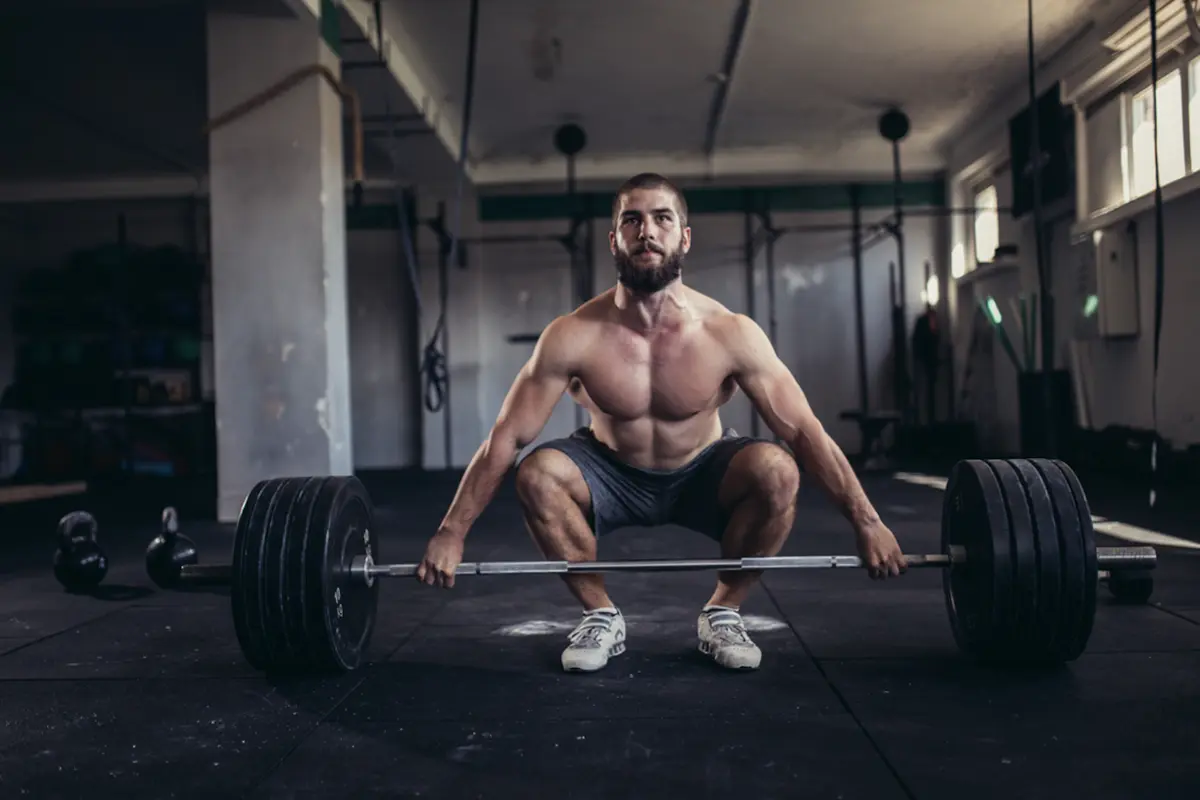
Advantages of a Vegan Diet in Athletic Performance
Enhanced Recovery Times
- One of the most significant benefits of a vegan diet is its impact on recovery.
- Plant-based foods are generally high in antioxidants and anti-inflammatory compounds, which can help reduce muscle soreness and speed up recovery after intense workouts.
- The quicker recovery allows for more frequent and intense training sessions, which can improve strength and performance.
Improved Cardiovascular Health
- A vegan diet is typically low in saturated fats and cholesterol, contributing to better cardiovascular health (Selinger et al., 2022).
- This benefits athletes, as enhanced heart health can improve endurance and stamina, enabling longer and more effective training sessions.
- Better cardiovascular health is associated with improved blood flow and oxygen delivery to the muscles, which are essential for powerlifting and other strenuous activities.
Optimal Body Composition
- Many athletes find that a plant-based diet helps achieve and maintain an optimal body composition (Wang et al., 2023).
- The high fiber content of a vegan diet can improve satiety and result in a natural reduction in calorie intake, helping fat loss while preserving muscle mass.
- This can be particularly advantageous for powerlifters looking to optimise their weight class without sacrificing strength.
Reduced Risk of Chronic Diseases
- Vegan diets have been linked to a lower risk of various chronic diseases, including type 2 diabetes, hypertension, and certain types of cancer (Key et al., 2021).
- Maintaining overall health is crucial for athletes' sports performance and longevity.
- Reduced risk of health issues can translate to fewer interruptions in training and a longer, more productive athletic career focused on wellness.
Increased Energy Levels
- Many vegan athletes report experiencing higher and more stable energy levels, likely due to the high intake of complex carbohydrates, vitamins, and minerals that support optimal energy metabolism.
- Consistent energy levels can enhance daily training performance and overall athletic achievement.
Conclusion: Embracing Vegan Powerlifting
The world of powerlifting food is changing. Vegan diets are becoming popular among strength athletes. Getting enough plant nutrients can be challenging, but planning and supplements can help. Vegan powerlifters should eat varied protein-rich plants, balance nutrients, and focus on B12, iron, and omega-3s.
Vegan diets can offer quicker recovery, better heart health, ideal body weight, less disease risk, and more energy. These advantages can improve performance in the short term and keep athletes healthy for years. Vegan powerlifters like Nick Squires show that being vegan doesn't hinder success in strength training.
Noah Hannibal, the reigning Oceania Bench Press champion, has been vegan for 30 years and has never eaten meat. He showcases high-protein vegan recipes and proves that strength and compassion can coexist.
To succeed as a vegan powerlifter, learn about nutrition, plan well, and try different plant foods and supplements. With more athletes going vegan, sports nutrition will evolve, changing how powerlifting and similar sports look in the future.
Frequently Asked Questions
Can I get enough protein on a vegan diet to support powerlifting?
Yes, you can get sufficient protein from plant-based sources to support powerlifting. Key protein sources include legumes, tofu, tempeh, seitan, whole grains, nuts, seeds, and vegan protein powders. Consuming various foods throughout the day helps ensure you get all essential amino acids. Many successful vegan powerlifters, like Nick Squires, have demonstrated that it's possible to build significant strength and muscle mass on a plant-based diet.
What supplements should vegan powerlifters consider?
Vegan powerlifters should consider supplementing with:
- Vitamin B12
- Iron
- Omega-3 fatty acids (from algae-based sources)
- Vitamin D
- Calcium
- Zinc
- Creatine
- Vegan protein powders can help meet increased protein needs.
How can I ensure I'm getting enough calories on a vegan powerlifting diet?
- To meet the high caloric demands of powerlifting on a vegan diet:
- Incorporate calorie-dense foods like nuts, seeds, avocados, and coconut.
- Increase portion sizes of whole grains and legumes.
- Use healthy oils in cooking and food preparation.
- Add smoothies with vegan protein powder, fruits, and nut butter to your daily intake.
- Eat frequent meals and snacks throughout the day.
Will soy products negatively affect my testosterone levels?
Research indicates that soy consumption does not adversely affect testosterone levels in men. Multiple studies and meta-analyses have shown no significant effect of soy protein or isoflavone intake on testosterone levels. Soy can be a valuable part of a vegan powerlifter's diet, providing high-quality protein and other essential nutrients.
How can I incorporate omega-3 fatty acids into my vegan diet?
While vegan diets lack direct sources of EPA and DHA (commonly found in fish), you can incorporate omega-3s through:
- Flaxseeds and flaxseed oil
- Chia seeds
- Hemp seeds
- Walnuts
- Algal oil supplements (for direct EPA and DHA)
References
- Hamilton-Reeves, J. M., Vazquez-Benitez, G., Duval, S., & Phipps, W. R. (2009). Clinical studies show no effects of soy protein or isoflavones on reproductive hormones in men: Results of a meta-analysis. Fertility and Sterility, 94(3), 997-1007.
- Lynch, H. M., Buman, M. P., Dickinson, J. M., Ransdell, L. B., Johnston, C. S., & Wharton, C. M. (2020). No significant differences in muscle growth and strength development when consuming soy and whey protein supplements matched for leucine following a 12 week resistance training program in men and women: A randomized trial. International Journal of Environmental Research and Public Health, 17(11), 3871.
- Salomé, M., de Gavelle, E., Dufour, A., Dubuisson, C., Volatier, J. L., Fouillet, H., Huneau, J. F., & Mariotti, F. (2020). Plant-protein diversity is critical to ensuring the nutritional adequacy of diets when replacing animal with plant protein: Observed and modeled diets of French adults (INCA3). Journal of Nutrition, 150(3), 536-545.
- Key, T. J., Papier, K., & Tong, T. Y. N. (2021). Plant-based diets and long-term health: Findings from the EPIC-Oxford study. Proceedings of the Nutrition Society, 81(2), 190-198.
- Langyan, S., Yadava, P., Khan, F. N., Dar, Z. A., Singh, R., & Kumar, A. (2022). Sustaining protein nutrition through plant-based foods. Frontiers in Nutrition, 8, 772573.
- Nichele, S., Phillips, S. M., & Boaventura, B. C. B. (2022). Plant-based food patterns to stimulate muscle protein synthesis and support muscle mass in humans: A narrative review. Applied Physiology, Nutrition, and Metabolism, 47(7), 700-710.
- Reed, K. E., Camargo, J., Hamilton-Reeves, J., Kurzer, M., & Messina, M. (2021). Neither soy nor isoflavone intake affects male reproductive hormones: An expanded and updated meta-analysis of clinical studies. Reproductive Toxicology, 100, 60-67.
- Selinger, E., Neuenschwander, M., Koller, A., Gojda, J., Kühn, T., Schwingshackl, L., Barbaresko, J., & Schlesinger, S. (2023). Evidence of a vegan diet for health benefits and risks - an umbrella review of meta-analyses of observational and clinical studies. Critical Reviews in Food Science and Nutrition, 63(29), 9926-9936.
- Wang, T., Masedunskas, A., Willett, W. C., & Fontana, L. (2023). Vegetarian and vegan diets: Benefits and drawbacks. European Heart Journal, 44(36), 3423-3439.